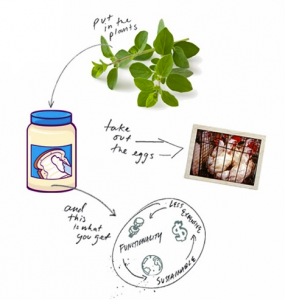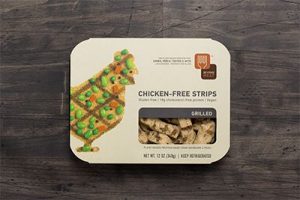The Future of Food
American entrepreneurship has changed the world more than once and will play a key role in defeating the factory farm. Farm Forward spoke to executives from two companies that recently turned the head of Bill Gates: Hampton Creek Foods and Beyond Meat. These compassionate companies are using technology and plants to create “cleaner food” that replicate animal products.
Americans are eating less and less meat,1 but global meat consumption is expected to double by 2050.2 “The world’s supersized appetite for meat is among the biggest reasons greenhouse gas emissions are still growing rapidly,” said Worldwatch Institute President Robert Engelman. “It’s largely a matter of rethinking meat at both ends of the production-consumption trail.”3
Never in the history of animal agriculture have consumption habits and production methods changed so radically and with such disastrous effects as they have in the past 70 years. Ninety-nine percent of meat, dairy, and egg products produced in the United States now come from factory farms.4 This cruel and unsustainable system has had enormous costs to animal welfare, the environment, and public health.
From college students majoring in business to CEOs like Bill Gates and Twitter co-founders Biz Stone and Evan Williams, the business world is increasingly our ally in the shift to a more sustainable, ethical, and healthy way of producing food. The system is ripe for reinvention.
WHERE TO BEGIN: THE CHICKEN OR THE EGG?
Over ninety billion eggs are produced in the United States annually,5 but many are not destined for use in omelets or eggs benedict. As Hampton Creek Foods tells us, a third of those eggs are used invisibly, meaning they are used as ingredients in processed or prepared foods like baked goods, mayonnaise, and sauces.
Hampton Creek Foods’ mission is to “replace these invisible eggs with a plant-based substitute that not only alleviates the suffering of egg-laying hens, but is more sustainable, less expensive, and better for our health as well.”
So how does Hampton Creek Foods replicate an egg? After all, it’s not only the taste that’s important to capture, but also eggs’ texture and cohesive quality.
“We look at hundreds of different plant proteins and screen them for functionality in different applications—how they work in emulsifications, can they help with leavening in baked goods, etc.,” Hampton Creek Foods’ CEO Josh Tetrick told us. “By testing large varieties of proteins, we are able to match, and in some cases surpass, the capabilities of an egg.”

Similarly, Beyond Meat is a company motivated by health, environmental, and animal welfare concerns to find a plant-based substitute for poultry.
Our goal is to provide consumers with clean, plant-based proteins that perfectly replicate the taste, texture, and nutritional benefits of meat. We share our customers’ enthusiasm for improving their health, reducing their ecological footprint, and improving animal welfare and are happy to be of service one savory, delicious, protein-packed bite at a time.” —Ethan Brown, Founder and CEO of Beyond Meat.
Brown acknowledges that creating Beyond Meat was a long and complicated process, but it looks like their hard work has paid off:
“We use super clean ingredients such as soy and pea proteins in a proprietary heating, cooling, and pressurization [process] to create delicious consumable meat that offers consumers 18 grams of protein per 3 ounce serving and 120 calories. Plus, these plant-based strips have no saturated or trans fat and are cholesterol free, gluten free, dairy free, meat free, egg free, GMO free, hormone free, antibiotic free, and guilt free.”

In an interview with Bill Gates, author Michael Pollan explains that cost was one reason why plant-based meat substitutes were not as viable in the past. “Mock meats of various kinds have been around for years, but … the price has been high: higher in many cases than real meat which, when you remember they’re mostly made from soy, makes little sense. But the market was small and specialized, and the economies of scale probably weren’t there.”
Hampton Creek Foods and Beyond Meat have been recognized by Bill Gates as leaders in the growing movement to harness innovation and technology to fix some of the biggest challenges posed by our food system.6
Farm Forward is encouraged to see that two of the most innovative companies in the clean food movement are focusing on poultry products, as no other farmed animal suffers more than chickens and turkeys in today’s factory farming system.
As consumers increasingly become aware of the factory farm system’s far-reaching and devastating consequences, the market for plant-based products has expanded, incentivizing efforts to improve quality and allowing production costs to decrease.
Impressive progress has already been made, and as more resources are put into research and development for solutions to these challenges, who knows how much further we can go in finding alternatives to factory farming? We believe these innovations to food production will be integral to changing the way our nation eats and farms.
With help from Hampton Creek Foods, Beyond Meat, and Farm Forward’s own initiative—BuyingPoultry.com—we will begin to shift the market share to choices that are not only highest welfare, but choices that actively work to reduce our ecological footprint.
Sign up for the Farm Forward newsletter to receive updates and important information about how you can get involved.
Last Updated
December 29, 2014
Endnotes
1.
Plumer, Brad, “Americans are eating less and less meat,” Washington Post, January 2012, available here.
2.
Bittman, Mark, “Rethinking the Meat-Guzzler,” The New York Times, available here.
3.
“Global Meat Production and Consumption Continue to Rise,” Worldwatch Institute, 2011, available here.
4.
Farm Forward calculation based on U.S. Department of Agriculture, 2002 Census of Agriculture, June 2004; and Environmental Protection Agency, Producers’ Compliance Guide for CAFOs, August 2003.
5.
Laux, Marsha, “Eggs Profile,” AgMRC, August 2012, available here.
6.
“Gates Notes: The Future of Food,” The Gates Foundation, April 2013, available here.